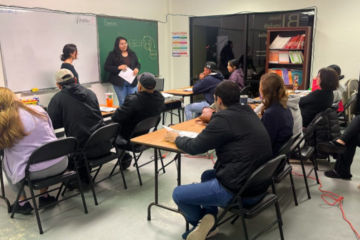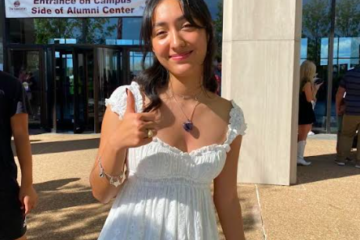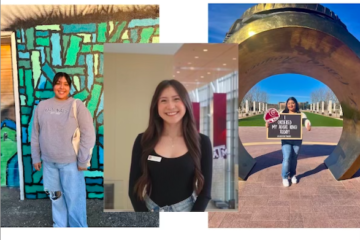In people’s lives, birthdays and anniversaries mark the passage of time. In the life of an organization, taking stock of what has been and thinking about what is to come often happen at the annual meeting. At BIIN’s annual meeting, held via Zoom on September 13, 2020, the board chair’s baton was passed from Mary Campbell to Jackie Zimmerman. (For more on Mary’s leadership of the board from 2018 to 2020, read this.)
In addition to Mary Campbell, three other long-serving members of the board stepped down after completing their terms in September: Zuleika Carrasco-Martinez, Carol Goldsmith, and Nancy Plankey-Videla. To thank them for their service and to hear more about what they have learned along the way, we wanted to check in with each of these women. Since when has each one been a part of BIIN and what have they done, in addition to serving on the board? What thoughts or advice do they have for the newly constituted board, as it leads the organization into 2021 and beyond?
Zuleika Carrasco-Martinez
Zuleika served on BIIN’s board from 2015 to 2020. Elected as an at-large member, she accepted the role of interim secretary in 2017, and continued as secretary to the board from 2018 to 2020. As secretary, Zuleika also served on the finance and executive committees.
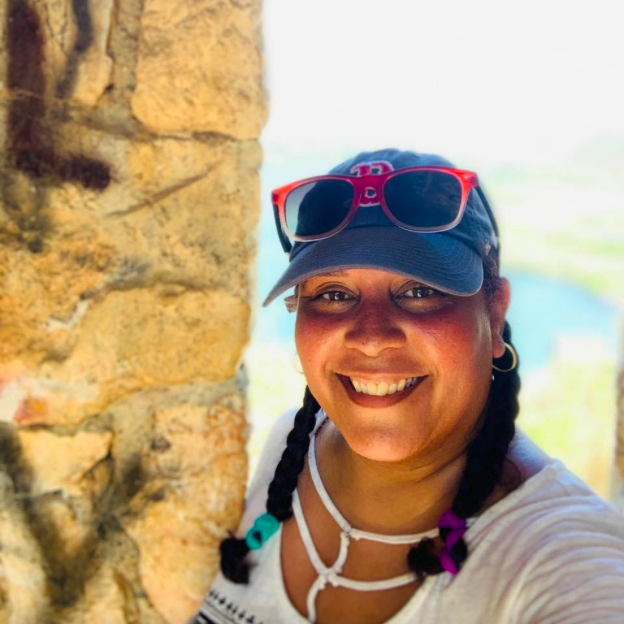
Zuleika is known, among other things, for her deep attachment to Puerto Rico (witness the Puerto Rican flag that proudly serves as her backdrop on Zoom and the quote that is part of her email signature: “No naci en Puerto Rico, Puerto Rico nacio en mi.”). Although Zuleika herself was born in Germany (when her father’s military station took the family there), her parents and siblings were all born in Puerto Rico and it is understandably central to her identity.
At BIIN, Zuleika is also known for her reliable presence and the very detailed notes she took without fail at board meetings. As Director Jaimi Washburn observed, “I don’t think she ever missed a meeting, and she was always the first board member to arrive!” When BIIN has held legal workshops for families, Zuleika has helped supervise children so that parents could focus on the presentations. She’s the kind of person who sees a need and steps up, without being asked.
In addition to serving the organization in these ways, Zuleika has done a great deal for BIIN through her role and connections on the Texas A&M campus. As academic advisor for students in Hispanic Studies and Sociology, Zuleika is in a natural position to recruit volunteers and interns for BIIN, and she has done so countless times over the years. She has also reached out to students in Latina/o sororities and fraternities on campus, and has regularly visited classes and other groups on campus to talk about BIIN and its work in the community.
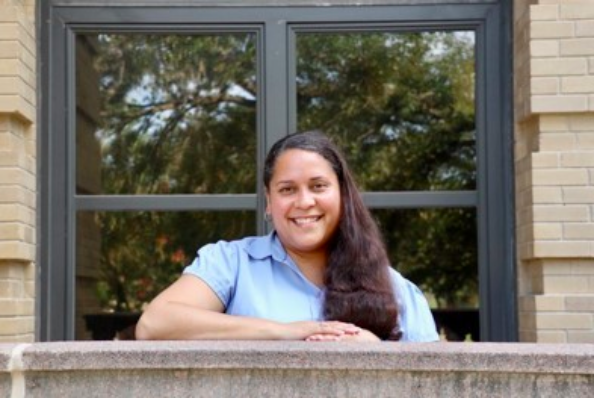
Looking back over her time with the organization, Zuleika thinks that BIIN has much to celebrate: she points to the steady increase in the numbers of people using BIIN’s services and benefiting from the resources it shares. She believes that BIIN’s investment in textbooks and revised curriculum for the citizenship and English language classes has been well worth it. She sees the increase in the numbers of people who have taken these classes and become U.S. citizens as evidence of the impact that BIIN has had locally. Zuleika also applauds the spirit and the success of the BIIN CARES Fund in spring 2020, enabling the organization for the first time to provide direct economic relief to neighbors in need.
As Zuleika cedes her place on the board to incoming members, she hopes that BIIN will continue to demonstrate creativity in responding to needs amplified by the pandemic. In particular, she hopes that program leaders and volunteers will keep using technology in ways that help expand digital literacy among members of the local community. Zuleika encourages the newly constituted board to do everything possible to continue to get the word out to the community about BIIN, its programs and services. Most importantly, she believes, “We need to make sure that the community knows that BIIN is a voice for immigrants and that this will not change.” Even as she steps down from the board, Zuleika intends to keep sharing this message loud and clear, through her work and connections on campus and throughout the community.
While it’s clear that Zuleika has put her skills to very good use for BIIN, she modestly suggests that she hasn’t done much and “wishes she had volunteered more.” Zuleika, please know how much your contributions to BIIN are appreciated, and continue to join BIIN as a volunteer, advocate and supporter, whenever and however you are able!
Carol Goldsmith
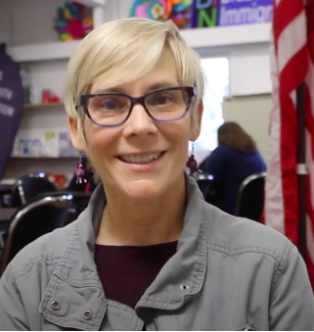
Carol Goldsmith served on BIIN’s board for a traditional three-year term, from 2017 to 2020. But her involvement with BIIN goes back to 2013. That’s when she joined the team of volunteers that teach the citizenship classes in English.
As a volunteer instructor, Carol has worked with other teachers to enrich and update the citizenship class curriculum twice — once in 2014, and again in 2019-20. Having helped to revise the curriculum and to teach the class for many years, Carol has clear ideas about what makes it work – both for the adults preparing to take the naturalization exam and interview, and the volunteers who work one-on-one with them. “We have fantastic volunteers,” she notes, “They are an integral part of the program’s success.” As students work with and get to know regular volunteers, Carol points out, “They connect — they form a community.” That sense of connection and community then helps to motivate students to learn the material and to freely ask any questions they have. You can see Carol in action, leading a citizenship class and explaining how the program fits into BIIN’s larger goals, in this short video created by Kimberly Lerma.
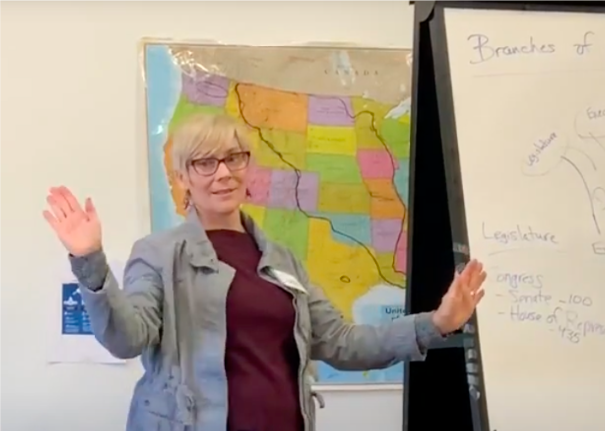
After joining the citizenship class teaching team, Carol got to know more about BIIN’s services to people in the local community. With others, she helped to organize a workshop to enable immigrant families to develop a detailed plan for what to do if a family member were detained or deported. Carol also became a notary public, so that she could notarize families’ documents before they left the workshop.
By 2017, Carol knew a great deal about BIIN’s programs and mission and was invited to join the board. As an at-large member of the board, Carol served on the committee that worked with “partner” institutions (such as local churches who support BIIN on an on-going basis) as well as the committee that worked to create a risk management plan for BIIN. Director Jaimi Washburn recalled how valuable Carol’s skills were to this specific task: “She is both resourceful and detail-oriented. She is an amazing proofreader and thinks about all sorts of different scenarios, which is useful in producing well thought-out policies.” Jaimi also underscored Carol’s reliability: “She always follows through on anything she commits to. You can count on her: if she says she is going to do something, she will do it.”
Carol, in turn, appreciates the positive outlooks and energy that she has found at BIIN: “I love the camaraderie of the Board and staff. We do challenging work and enjoy doing it. They inspire me with their ‘how can we make this happen?’ attitude.” Looking back on what the organization has accomplished in recent years, Carol emphasized the importance of BIIN’s ability to respond to emerging needs and new challenges: “I have been very impressed with BIIN’s innovations in providing services and support for our immigrant neighbors, through programs such as BIIN CARES, Línea Amiga, and the Family Safety Plan workshops. Plus, we have expanded our professional staff. We have continued to provide programs and services during COVID! And now we are ramping up our fundraising efforts.”
Thinking about how BIIN can meet these goals and challenges moving forward, Carol pointed out that one of the organization’s key strengths has always been its connections with people from many different parts of the local community: “The immigrant liaisons are a vital component of our Board, helping us keep current with community concerns and sharing information back to the community. We are also connected to A&M by having CMSA members on our Board,” she observed. “And BIIN continues to connect with amazing volunteers and interns.”
Like others long committed to the mission of BIIN, Carol Goldsmith is continuing to help teach citizenship classes, even though her term on the board has come to an end. We are grateful to Carol for all the ways that she has put her skills and energy to BIIN’s service, and we look forward to continuing to connect as communications, programs and events bring us together, both virtually and (we hope) safely in person again one day. Thank you, Carol, for all that you have given and continue to give to BIIN!
Nancy Plankey-Videla
Nancy Plankey-Videla has been so deeply involved with BIIN’s history and work from the very beginning that summarizing her contributions is no easy task. Nancy is recognized as one of BIIN’s “founders:” she was part of the conversation in 2010 that led to launching BIIN as well as the group that met over several months to hammer out the organization’s by-laws and structure. As she explains it, BIIN was born from the realization that despite the ceaseless efforts of individual leaders, immigrants in the Brazos Valley needed better access to legal, educational and social services; and that other than the ministries of Santa Teresa Catholic Church in Bryan, there were “no organized services for immigrants in B/CS.” BIIN was created to share the work of ensuring access to needed services and resources, for all of our neighbors, regardless of immigration status, income, language ability or other qualifiers.
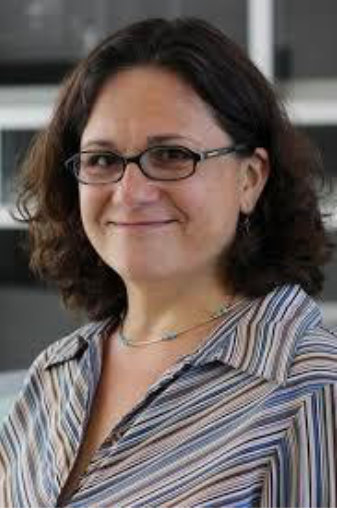
Nancy has served on BIIN’s board, continuously, from its beginning in 2011. She has taken on many roles – as an at-large member, board secretary, vice chair – and served on committees too numerous to name. Although she could have chaired the board, her passions have drawn her instead to the work of creating and carrying out programs. And her record in regard to programs and services is quite remarkable.
As Nancy tells the story, she began by helping to teach citizenship classes in Spanish. She was part of the volunteer teaching team long enough to remember that the classes were held first at Catholic Charities, then at St. Thomas Episcopal Church, and finally at the BIIN offices. In photos of citizenship classes (like the one below from 2017) and in the stories of individuals who obtained their citizenship through BIIN, Nancy is often present. Given her ease in moving between Spanish and English, her knowledge, sense of pedagogy, and capacity to foster personal connections, Nancy brought a great deal to the citizenship classes. But knowing that the classes were in good hands with Rich Woodward and others, she stepped down in 2019, so as to have more time to devote to other initiatives.
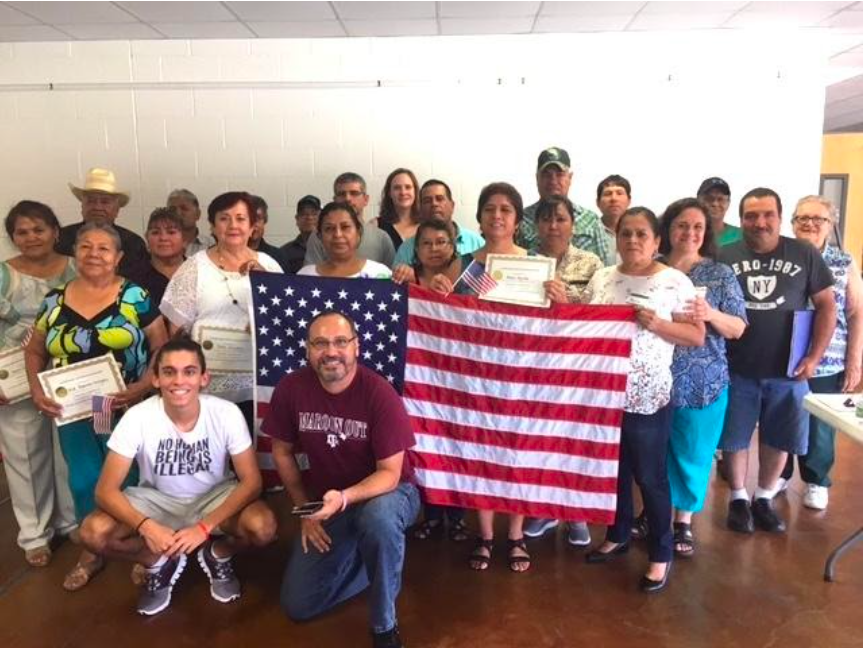
At the same time as Nancy was helping teaching citizenship classes, she became interested in what BIIN could do with respect to workers’ rights. Starting in 2014, Nancy worked with Angelita Garcia-Alonzo (at Santa Teresa) and others to learn about how other organizations were educating workers about their rights and advocating with them, and to bring those lessons to the Brazos Valley. As she recalled, “In 2015, the CDL (Centro de Derechos Laborales) was formed, and I was part of that from the beginning. That was my main commitment for many years.”
As a natural outgrowth of her interest and expertise in this area, Nancy also volunteered with BIIN’s Information, Referrals and Assistance (IRA) program, eventually specializing in cases of wage theft. Nancy has often been instrumental to the outcome of many such cases taken on by BIIN. While acknowledging her pride in “the ways we made a difference for workers… and the money we collected for wage theft at multiple worksites,” Nancy emphasizes that it is the power of a larger community holding employers accountable that ultimately explains their success.
In addition to working with citizenship classes, workers’ rights and wage recovery, Nancy has played essential roles in many other BIIN programs over the years. She is quick to perceive new needs on the part of immigrants and to develop strategies to meet them. This is evident in the ways that Nancy has led and invested in initiatives such as: legal workshops (to create family safety plans, establish a Power of Attorney, or renew DACA status); Sanctuary in the Streets/Red-Migrante (in response to ICE raids); and most recently, the BIIN CARES Fund, Línea Amiga and related efforts to create and share information and resources, in response to the pandemic. Besides her readiness to plan and do what needs to be done, Nancy is known for her skills in speaking to diverse audiences. As Director Jaimi Washburn observes, “She is always willing to talk to reporters, college students conducting research, elected officials, etc. — to help educate the public on issues that affect immigrants.” Working both within and beyond the organization, Nancy has contributed immensely to expanding the range and impact of BIIN in the Brazos Valley.
As BIIN approaches its ten-year anniversary, Nancy points to the impact that the organization has had by engaging with people and groups from across the area. As she puts it, “The fact that BIIN exists legitimizes and makes it clear that immigrants are a valued part of our community. It’s important that they know they have a place to go. IRA, for example, has helped to solve individual or family problems, and that’s good. But knowing that immigrants are not alone, and sending this message to the community, that’s very important.”
Having served on the board and worked closely with many of BIIN’s services for years, Nancy also has a unique perspective on the challenges the organization faces at this juncture. When asked what members of the newly constituted board should keep in mind, she pointed to two key considerations:
First, local families’ need for economic relief is still acute. Because federal coronavirus relief legislation excluded many immigrant households, and because of the ways that the pandemic and the associated economic crisis have disproportionately impacted Latinos, people of color, essential workers and low-income households, many families, including those headed by immigrants, are still struggling. As Nancy put it, “The Board will have to think seriously about doing another fundraising campaign… and perhaps extending BIIN CARES.”
Second, it is immigrants’ voices and experiences that should guide BIIN’s decisions and priorities. In order for this to happen, the board needs to continue to do everything that it can to be attuned to what immigrants share of their experiences. Nancy is prompt to recognize the difficulty of recruiting immigrants to serve on the board: for anyone who has an inflexible job, limited free time, is not comfortable speaking English or meeting online, the prospect of joining the board may have little appeal. “It still is and always has been hard to include immigrants on the board,” Nancy observes. “But their voices, their experiences should always be what guides BIIN’s mission. As programs are shifted, grown, or ended, as decisions are made, we want those voices to be there.”
Supporting immigrant liaisons in the task of connecting with different parts of the immigrant community and reporting these findings to the board is one way to amplify attention to immigrant voices. The board can also work to overcome barriers to full participation, in its own proceedings and in programs for wider audiences. As Nancy points out, “Investing in translation and language accessibility is important. And even if it means an extra expense, getting a digital device to a community member, so that they can participate in a meeting or a program, is important.” In such ways, BIIN can ensure that all members of our community feel welcome, valued, and essential to our shared future.
Given her long record of engagement with BIIN, the decision to step down from the board in September 2020 is not one that Nancy Plankey-Videla took lightly. As she explained, “It was a very difficult decision, bittersweet. I’ve really enjoyed working with the community. I think of the citizenship classes and friends made there as very special. Likewise, I’m grateful for the lifelong friends I made through our wage recovery efforts. My kids have grown up with BIIN, participated in its programs, and that’s something else the organization gave to my family.”
As any of us knows, there also comes a time when we are called to look at the range of our commitments, and to consider adjusting the balance. In Nancy’s case, this meant “stepping down from the board but not saying goodbye to BIIN.” As she clarified, “I will still be working on wage theft cases through IRA, and available for things that BIIN might need. I’m not leaving, but I need to step down from the board and let others step up.”
And so we say thank you, Nancy, for all that you have given, created, and made happen through your service to BIIN: we thank you for your vision, your collaborative spirit, your willingness to work behind the scenes as well as in the spotlight, your capacity to respond to people’s needs with empathy and imagination, your commitment to justice, and your passion in educating and advocating for a better world. We wish you grace and god speed, and a resounding “Gracias, Doctora,” but rest assured: we also are not about to say good-bye.
